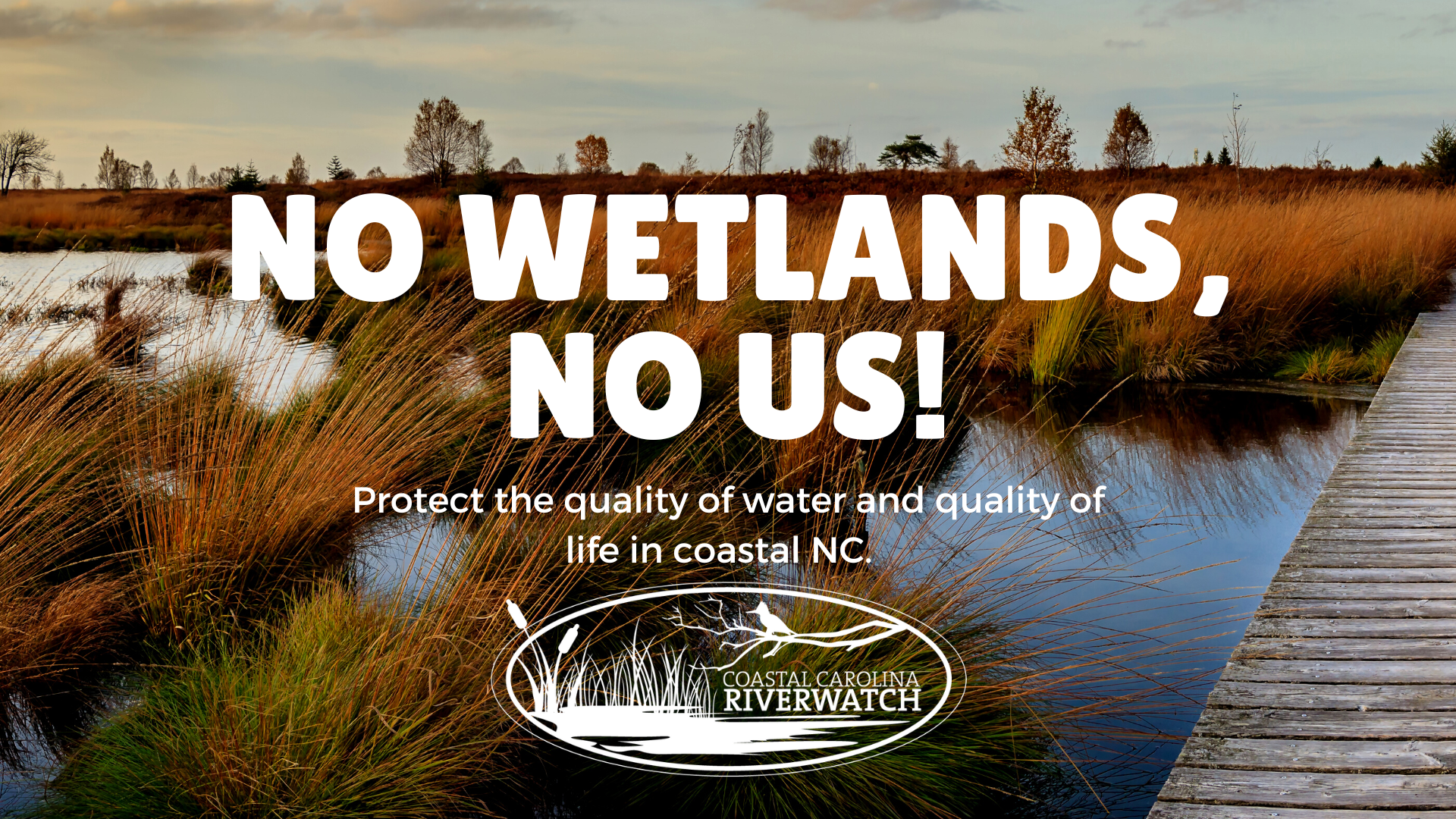May 2023 ADVOCACY ALERT:
Three bills (S582, S686, and S744) pending in the General Assembly contain identical language that would eviscerate the state laws that protect wetlands. If enacted, the provision would diminish crucial services that wetlands provide all North Carolinians, including flood protection, water purification, and fisheries habitat.
The North Carolina State Constitution requires the state government to protect the state’s lands and waters for the benefit of all North Carolinians, and it specifically includes wetlands as among the state’s significant resources that must be preserved. Current state laws do that.
Valuable wetlands in North Carolina would be destroyed under the proposed provision to redefine state wetlands as including only those wetlands that meet the federal definition of “waters of the United States” under the Clean Water Act. North Carolinians would lose flood protection and other crucial services provided by the many state wetlands that don’t meet the federal definition.
Current state wetlands laws work well. Most applicants seeking permits in North Carolina to develop land that contains wetlands get their permits. Current laws simply require them to take steps to avoid or mitigate the harm caused by their projects in terms of lost wetlands, increased flooding, etc. It is only fair to require landowners to take responsibility when their actions on their own land harm their community and put at risk others downstream.
The federal Clean Water Act focuses on eliminating pollution and restoring the “chemical, physical, and biological integrity” of “navigable waters,” which are defined as “waters of the United States,” and has never protected all wetlands from all threats.
The federal definition of “waters of the United States” expands at times to include more categories of waters and contracts at other times to include far fewer. Wetlands have historically been among the first type of waters to lose protection under federal law.
In contrast, current state laws protect all wetlands within the state and therefore provide continuity and full coverage by filling the fluctuating gap left by the ever-changing federal definition.
Current state protections provide much-needed protection from flooding. Wetlands act like sponges, absorbing water to help protect nearby and downstream communities by slowing and lowering floodwaters – a potentially lifesaving combination, especially after storms. A single acre of wetlands can store almost one million gallons of water, providing benefits both in place and for flood-prone communities downstream.
To pass a law that endangers wetlands at a time when flooding is on the rise and clean drinking water is in short supply would be irresponsible and threatens North Carolina’s communities. In recent years, floods have caused massive property damage and loss, loss of life, and business interruptions in communities near rivers. Flooding associated with storms like Hurricane Floyd in 1999 and Hurricane Matthew in 2016 caused particularly devastating flooding in eastern
North Carolina, but communities have also experienced devastating flooding after just a few days of rain, like Kinston did in 2017. Buildings constructed on wetlands are prone to water damage as well. Protecting all wetlands helps minimize these harms and protect communities.
In late 2021, the General Assembly passed a law to promote flood resiliency planning and set aside tens of millions of dollars to help local governments prepare for and recover from floods. To pass a law that rolls back state wetland protections and exacerbates the flooding problems that the 2021 law devotes millions to fixing would be reckless and waste government resources.
Wetlands also provide other crucial services for all North Carolinians. They filter and clean drinking water and allow water to slowly infiltrate into the ground to replenish aquifers.
As we say along the coast, “No wetlands, no seafood.” Wetlands are critical to protecting water, fish, and shellfish for our valuable commercial and recreational fisheries. North Carolina’s wild- caught seafood industry contributes nearly $300 million in value and 5,500 jobs to the state’s economy.
Wetlands are home to waterfowl and other wildlife that draw tourists and hunters from across North Carolina and the country. The economic benefits of hunting and fishing are especially pronounced in rural areas, where money brought in during fishing and hunting seasons can keep small businesses operational for the entire year.
The fluctuating federal protections often do not extend to categories of valuable and unique wetlands present in North Carolina, such as Carolina bays, pocosins, cypress savannas, and other geographically isolated wetlands, found in Bladen, Robeson, Columbus, and Brunswick counties, among others. For example, under the 2020 federal rule defining the scope of Clean Water Act, over 500,000 acres of wetlands in the Cape Fear Watershed alone were excluded from federal protection.
Geographically isolated wetlands have been protected by the state since at least 2001. In 2014 and 2015, the General Assembly further solidified state protections by passing two laws that mandated preservation of ecologically significant “isolated wetlands” that are not protected under federal law. To pass a contrary law now, just a few years later, that strips protections from those important natural resources makes no sense and creates a sense of whiplash for those who are subject to the laws.
Wetlands are disappearing three times faster than forests. An interagency work group identified the Cape Fear watershed in eastern North Carolina as experiencing one of the highest rates of wetland loss in the nation. The state cannot afford to lose even more wetlands due to ill-advised legislation.
SOURCE: SELC 5/5/2023
2023 State Wetlands Legislation
Three bills (the Farm Bill (S582); the Regulatory Reform Bill (S686), and the Environmental Permitting Reforms Bill (S744), all contain almost the exact same language.
Please make your voice heard about these bills. Click the “Find Your Representatives” on the CCRW website tab or click here. Feel free to use these talking points and tell your own story about how wetlands protect the quality of water and life here in coastal NC.

